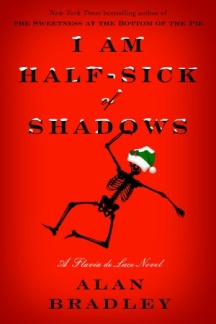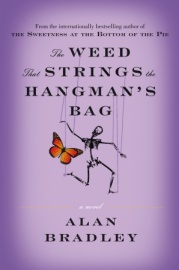 The Sweetness at the Bottom of the Pie, by Alan Bradley (Doubleday Canada, 2009)
The Sweetness at the Bottom of the Pie, by Alan Bradley (Doubleday Canada, 2009)
Flavia de Luce is an 11-year-old girl whose approach to her older sisters’ pranks is “letting the soup of revenge simmer to perfection” (p. 4). The girls’ mother died when Flavia was a baby, and their father has never recovered. He’s distant and inattentive, and the girls have the run of their sprawling, centuries-old house in 1950’s England.
Flavia concocts some rather beastly revenges, such as dissolving sister Ophelia’s pearls in acid and adding poison to her lipstick, but it’s with a child’s spitefulness rather than any sense of evil. Although she’s a genius in the house’s private chemistry lab (poison is her passion), she’s a bit short on interpersonal skills. As the novel opens, she’s vaguely fond of her father and would happily embrace never seeing her sisters again. She takes the people in her world for granted, as children do.
Flavia would be a terror to live with, but she makes a charming narrator. Her point of view is never dull and often sprinkled with humour and clever turns of phrase. There are too many wonderful descriptions to quote, but here’s how she describes her home: “[The] two yellow brick annexes, pustulently Victorian, folded back like the pinioned wings of a boneyard angel, which, to my eyes, gave the tall windows and shutters of Buckshaw’s Georgian front the prim and surprised look of an old maid whose bun is too tight” (p.5).
Mr. de Luce loves his stamp collection more than his own daughters. Perhaps he feels it’s safer ground. One day a stamp turns up at the kitchen door—impaled on the beak of a dead bird.
That evening Mr. de Luce has a secret visitor, and the next morning Flavia finds the man’s body in the cucumber patch. Fearing that her father or the family’s gardener might be involved, and irritated with the police Inspector for excluding her from the crime scene, Flavia determines to solve the mystery herself.
She reminds me a bit of Eoin Colfer’s Artemis Fowl, minus the fairies and criminal tendencies. Like Artemis, the dangers she faces help her begin to understand her family and her heart. I think that’s where the novel’s title fits in. It refers to a quote from William King’s The Art of Cookery, “Unless some sweetness at the bottom lie, who cares for all the crinkling of the pie?”
As with her human relationships, Flavia doesn’t give much thought to faith. It’s there in the background, another part of her life’s framework. Author Alan Bradley treats it with care, something I rarely find but always appreciate in a mainstream-audience book.
I must also say, as a Canadian, I thoroughly enjoyed reading a book with Canadian spellings. That too is a rare experience these days.
I read the novel once to see what happened, and a second time to enjoy the language. Flavia may be 11 years old, but this isn’t a book for children. It’s rich in nuance, vocabulary and detail, clearly designed for adults’ experienced palates.
I’d love to share the best lines with my husband but I’ve resisted—for the most part. I don’t want to spoil it for him.
Canadian author Alan Bradley has created a fascinating character in Flavia de Luce, and I’m glad to see two more novels to follow this one: The Weed that Strings the Hangman’s Bag [or Tied Up With Strings] (2010) and Dance, Gypsy! Hang, Gypsy! (2011). Flavia certainly seems to be capturing the imaginations of readers the world over. There’s even a Flavia de Luce fan club—for adults.
Mr. Bradley is co-author (with Dr. William A.S. Sarjeant) of the non-fiction Ms. Holmes of Baker Street and author of The Shoebox Bible. Before being internationally-published, his first novel The Sweetness at the Bottom of the Pie received the (British) Crime Writers’ Association’s Debut Dagger Award in 2007.
Like this:
Like Loading...
 The Dead in Their Vaulted Arches, by Alan Bradley (Random House, 2014)
The Dead in Their Vaulted Arches, by Alan Bradley (Random House, 2014)



 The Weed that Strings the Hangman’s Bag
The Weed that Strings the Hangman’s Bag The Sweetness at the Bottom of the Pie
The Sweetness at the Bottom of the Pie